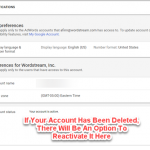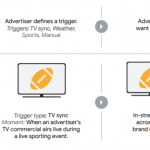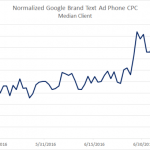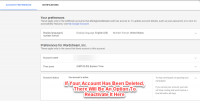How To Prepare For Changes To AdWords Enhanced CPC
How To Prepare For Changes To AdWords Enhanced CPC
by David Grow , Op-Ed Contributor, June 9, 2017
An automated bidding strategy within Google AdWords, Enhanced CPC (ECPC) has been around for several years. The strategy considers an array of information, including device, browser, location and time of day, to adjust bids up or down by up to 30%. Basically, it allows Google to raise bids when it determines that a conversion is more likely and lower bids when the conversion is less likely.

There are slight differences between ECPC for Shopping and text ads. For instance, ECPC for Shopping only works on Google search, whereas ECPC for text ads works on the Search Network and Display Network.
In addition, ECPC does not adjust for the differences in conversion rates between mobile and other devices. In other words, mobile traffic and desktop traffic are treated the same, if all other factors (audience, time of day, etc.) are the same.
What’s Changing
On May 9, Google announced that ECPC was improving to remove the previously mentioned 30% limitation. With the change, ECPC will be uncapped and allowed to increase or lower bids as much as it deems necessary to maximize performance within each auction. The rollout was announced for early June, so it is likely that advertisers are beginning to see the effects in select accounts.
Next Steps for Advertisers
First, as with any big change that Google rolls out, advertisers should take stock of where they are using ECPC (for a quick check, refer to the settings tab in AdWords).
Second, once advertisers isolate campaigns where ECPC is in place, they should ensure that their budgets are appropriate. It is not uncommon for advertisers to have budgets in place that greatly exceed normal daily spend levels. Be sure that if costs do spike, that spend doesn’t exceed a comfortable amount. In addition, ensure that none of your campaigns that utilize ECPC are in a shared budget with other non-ECPC campaigns. There is nothing wrong from a technical standpoint with having them together, but if costs do spike due to ECPC changes, advertisers won’t want their entire shared budget consumed by those price spikes.
Third, evaluate your historical device performance wherever ECPC is in place. As mentioned before, ECPC does not adjust for the difference in conversion rates between mobile and other devices. Advertisers who see poorer performance on mobile should already have device-level adjustments in place to compensate for this. However, with ECPC now changing to being uncapped, mobile bid adjustments may be essentially overridden by the algorithm adjustment.
For example, to illustrate the point, imagine that Keyword A has a max CPC of $1.00 and a mobile bid adjustment of -50%. Under previous conditions, the mobile bid would be $1.00 x -50% = $0.50. The most Google would enhance that bid would have been 30%, raising it from $0.50 to $0.65. With the new changes, there is no limit to what the bid strategy can raise the bid, making the $0.50 potentially exceed the desktop CPC.
Now, presumably this will only happen in a few auctions and will be based on good information that is pushing the bids only under optimum conditions. However, since device is not being considered by Google, it is vital that advertisers do a good job of implementing mobile adjustments that accurately reflect the comparative value of mobile traffic to desktop traffic at the ad group level for each ad group affected by ECPC.
Lastly, advertisers should compare the CPC to bids each day (only where ECPC is in place) to ensure that if the ECPC change has rolled out, any big discrepancies between CPC and bid are accounted for and evaluated.
In principle, using multiple signals (such as audience, time of day, or browser) to determine what a keyword or product group bid is during each auction should allow advertisers to get in front of the right people at the right times. In practice, new products (including bid strategies) sometimes have unforeseen complications.
As long as advertisers consider the implications of these new products and stay diligent in monitoring their effects, they should stay on top of any potential issues.
MediaPost.com: Search Marketing Daily
(29)













